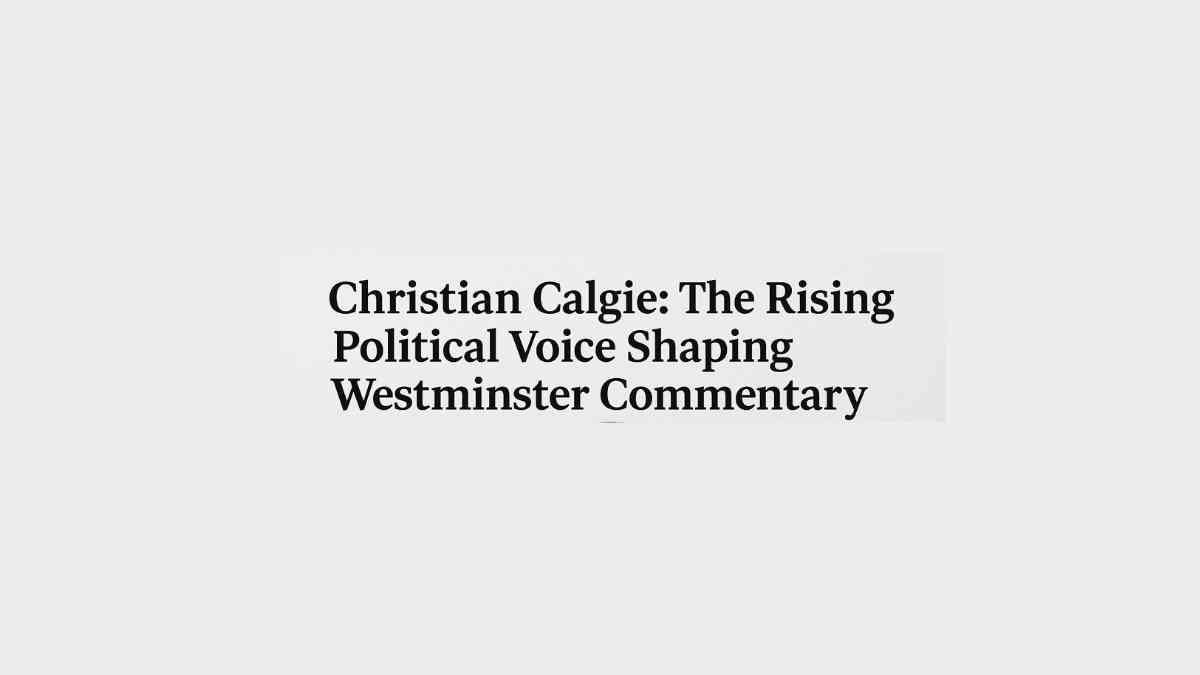Christian Calgie: The Rising Political Voice Shaping Westminster Commentary

Christian Calgie is swiftly becoming a prominent voice in British political journalism. Known for his fearless reporting and distinctive YIMBY (Yes In My Back Yard) stance, Calgie has moved from the shadows of Westminster gossip to a respected place at the Daily Express. His story reflects a new breed of political correspondent: bold, plugged-in, and never afraid to challenge the status quo. This article explores Christian Calgie’s professional background, his journey through British media, personal influences, and his impact on political discourse across the UK.
Early Life and Education
Christian Calgie was born in April 1997. He studied at the University of Hull, a decision that shaped his formative years and laid the groundwork for a career in political reporting. While Hull may not be the most traditional starting point for a future Westminster insider, Calgie used his university years to develop the skills and insight that would define his journalistic voice.
From a young age, he was captivated by politics, current affairs, and the mechanisms of government. That fascination quickly turned into action. By his early twenties, Calgie was already working with some of the most combative outlets in British media.
Rise Through Guido Fawkes
Christian Calgie began his professional journey with the well-known political blog Guido Fawkes. For over three and a half years, he played a key role in breaking exclusives, investigating politicians, and commenting on the corridors of power. His tenure at Guido Fawkes saw him sharpen his style — punchy, unapologetic, and fast-moving.
The platform gave him a front-row seat to the political drama of Brexit, party leadership changes, and the ever-turbulent internal affairs of Westminster. His contributions often carried the sting of irreverence but remained grounded in factual reporting. Calgie didn’t just report on politics; he dissected it.
While some critics labelled Guido Fawkes as partisan or sensationalist, Calgie brought a layer of credibility to the outlet’s often explosive stories. He understood the importance of accuracy and timing in political journalism, which earned him trust among certain MPs and media insiders.
Transition to the Daily Express
In February 2023, Calgie took a major step forward in his career by joining the Daily Express as its Senior Political Correspondent. This move marked a shift from niche insider reporting to mainstream national journalism.
At the Express, Christian Calgie began writing for a broader audience without losing the sharp edge that defined his earlier work. He quickly became known for the Beachcomber Diary — a witty, insightful column that combines light political musings with serious undertones. It offered readers a digestible, entertaining look into the lives of politicians and the undercurrents of power in Whitehall.
More importantly, his appointment signified the changing face of political reporting. No longer confined to older, establishment voices, the political press corps was being invigorated by reporters like Calgie — young, sharp, and unafraid.
Media Appearances and Public Profile
Beyond the printed page, Christian Calgie has become a familiar face on TV and radio. His media appearances are marked by a confident yet composed style. Whether discussing policy failures, election strategies, or scandals, he delivers insights with clarity and wit.
He has appeared on networks like GB News, where his commentary during incidents such as Matt Hancock’s public scrutiny and the backlash against films like The Lady of Heaven sparked important discussions on censorship, public accountability, and media ethics.
Christian’s social media presence, particularly on X (formerly Twitter) and Instagram, also reflects his dual identity as both commentator and citizen. With thousands of followers, he’s part of a new generation of journalists who engage openly with their audience. He frequently invites tip-offs, shares breaking news, and interacts with both critics and fans — all in real time.
His YIMBY Stance
One of Christian Calgie’s most defining personal positions is his commitment to the YIMBY movement. In a time when housing is one of the UK’s most pressing issues, Calgie has consistently voiced his support for increased development, urban densification, and the dismantling of outdated planning restrictions.
His YIMBY views are not simply ideological. They are grounded in economic reasoning and social equity. Calgie argues that Britain’s housing crisis is driven largely by systemic barriers to new construction — and he isn’t afraid to challenge NIMBY (Not In My Back Yard) attitudes, even among his own audience.
By aligning himself with YIMBY principles, Calgie places himself at the centre of a larger national conversation. This position distinguishes him from many political journalists who often shy away from taking a public stance on controversial topics. His honesty, even when divisive, contributes to his credibility.
Style of Reporting and Influence
Christian Calgie’s writing style is crisp, engaging, and often laced with humour. But underneath that wit is a serious commitment to holding power accountable. He’s a rare mix: a writer who can entertain and inform without diluting the substance of his reporting.
His influence stretches beyond his employer. Calgie is now considered a go-to commentator on breaking political developments. His tweets are quoted by rival outlets, his stories spark debate in Parliament, and his sources often include high-ranking officials.
He has cultivated a reputation as someone who gets the story — not just accurately, but quickly. In the digital age, speed and trust are everything in journalism, and Calgie manages to balance both.
Challenges and Criticism
No successful journalist escapes criticism, and Calgie is no exception. His forthright style has occasionally sparked backlash, particularly from those on the receiving end of his exposés. Some accuse him of being too close to certain political ideologies, while others claim his YIMBY stance oversimplifies complex urban issues.
However, these critiques are part and parcel of serious political journalism. Calgie has largely responded by letting his work speak for itself. He rarely engages in online spats and maintains a professional tone even when criticised. That self-restraint — especially in an era of clickbait conflict — is a mark of his maturity as a journalist.
Future Prospects
At just 28 years old, Christian Calgie has already achieved what many political reporters aspire to: national prominence, media influence, and respect from peers. But his trajectory suggests that this is just the beginning.
As British politics continues to evolve — with shifting party dynamics, housing reform debates, and generational change — Calgie is likely to remain a key observer and interpreter. His instincts, cultivated from years in both fringe and mainstream media, give him an edge.
Some speculate that he could eventually move into editorial leadership or even author a political memoir. Others wonder if he might transition into policy work or advocacy, particularly in the realm of housing and development. Regardless of direction, it is clear that Christian Calgie’s voice will remain significant.
Conclusion
Christian Calgie is more than just a name on a byline. He represents a new generation of journalists: informed, opinionated, and deeply embedded in the political heartbeat of Britain. From his early days at Guido Fawkes to his current role at the Daily Express, Calgie has proven that youth is no barrier to influence.
In a media landscape often dominated by legacy voices, Calgie stands out as a fresh perspective. His sharp analysis, fearless commentary, and principled stands — especially on housing — ensure that his reporting resonates beyond the page.



